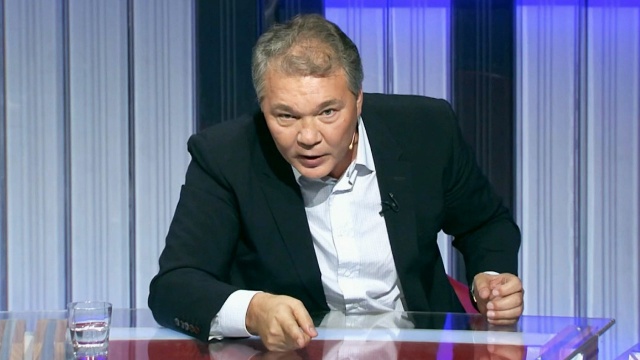A member of Russia’s State Duma, or parliament, said that one of the reasons why the Nagorno-Karabakh conflict between South Caucasus neighbors Armenia and Azerbaijan has never been resolved is the indifferent attitude by Western powers.
Leonid Kalashnikov, a member of parliament (MP) and Head of the Duma Committee on CIS Affairs, Eurasian Integration and Relations with Compatriots, said he has doubts about what NATO and its member states’ actions in the name of peacekeeping.
“I do not really believe in the peacekeeping of NATO and its member countries,” Kalashnikov told Oxu.az on Wednesday. “Accordingly, I do not really believe in the [efforts of] the Minsk contact group,” he said, referring to the intergovernmental body established by the Organization for Security and Co-operation in Europe (OSCE) that is co-chaired by three senior-level diplomats from Russia, the United States and France.
“It is significant that for so many years they have not been able to resolve the Armenian-Azerbaijani conflict,” Kalashnikov said. “The reason for this must be looked for in the fact that America and the European Union do not really want this decision.” The OSCE’s Minsk Group was established in 1992, the year after the Soviet Union was dissolved and 15 independent post-Soviet republics were formed, including the Republic of Azerbaijan and the Republic of Armenia.
In the late 1980s, when the USSR was in its twilight years, Armenian nationalists decided to make a land grab, eying Azerbaijan's Nagorno-Karabakh region that had been partially populated with ethnic Armenians alongside indigenous Azerbaijanis. Once the Soviet Union collapsed in 1991, Armenia kicked off a military campaign against Azerbaijan. Twenty percent of Azerbaijan’s internationally recognized territory, namely the Nagorno-Karabakh region and seven surrounding districts, were occupied by Armenia during a full-scale war that lasted until a ceasefire deal in 1994, and remains under occupation to this day.
In 1993 the United Nations Security Council passed four legally binding resolutions calling for Armenia to fully withdraw its forces from Azerbaijan, but all four go unfulfilled so far. Despite over two decades of what some observers call “shuttle diplomacy” – the three co-chairs are notorious for frequent trips to the region to observe developments, but with no end to the conflict in sight – the group has failed in its efforts to find a solution to the conflict. The long-lasting conflict threatens to escalate into a full-fledged war, as it morphed into a bloody war over four days from April 1 to 5 in 2016, following Armenian shelling of Azerbaijani villages. Armed clashes, which were later recognized as the April War, or Four Day War, resulted in Azerbaijan's liberation of about 2,000 hectares (approximately 5,000 acres) of its land, including a village, and two strategic hills.
“Azerbaijan, Russia, and Armenia - nations from one state [the Soviet Union]. I believe that the three leaders of these states should get together and solve this problem. I do not know how strong-willed is the man that is the current leader of Armenia, but since there is a strong-willed [president of Russia] Putin, a strong-willed [president of Azerbaijan] Aliyev, they will have to solve this problem,” Kalashnikov told Oxu.az.
President Putin said in a meeting with his Azerbaijani counterpart Ilham Aliyev in Sochi in September that Russia is determined to push ahead with efforts to resolve the Nagorno-Karabakh conflict.
But the new leadership in Yerevan puts the negotiation process on ice once again. Armenia’s Prime Minister Nikol Pashinyan, who came to power in April and won the snap parliamentary elections held on December 9, has been insisting on the participation of the separatist regime in the Nagorno-Karabakh region as a party to any negotiation. In a meeting with the business people in Moscow on September 9, Pashinyan said that Nagorno-Karabakh should be annexed to Armenia as a full-fledged part of the country’s territory in the future.
However, the government in Baku rejects the idea of including what is an unrecognized, self-styled illegal separatist regime in the occupied Nagorno-Karabakh region. President Aliyev said in a meeting with the OSCE Secretary General Thomas Greminger in Baku on September 12 that the thesis that Azerbaijan has to hold talks with what Baku sees as a bogus "Nagorno-Karabakh Republic" is totally unacceptable.







 Armenian sappers commenced on Monday mine-clearance operations in the territories adjacent to the Saint Mary Church in village of Voskepar (Armenia...
Armenian sappers commenced on Monday mine-clearance operations in the territories adjacent to the Saint Mary Church in village of Voskepar (Armenia...
 Iran and Pakistan have signed eight cooperation documents in various fields, and agreed to strengthen ties to fight terrorism in the region.
Iran and Pakistan have signed eight cooperation documents in various fields, and agreed to strengthen ties to fight terrorism in the region.
 President Aliyev emphasized the critical role of the North-South Transport Corridor in fostering transport cooperation between Azerbaijan and Russi...
President Aliyev emphasized the critical role of the North-South Transport Corridor in fostering transport cooperation between Azerbaijan and Russi...



